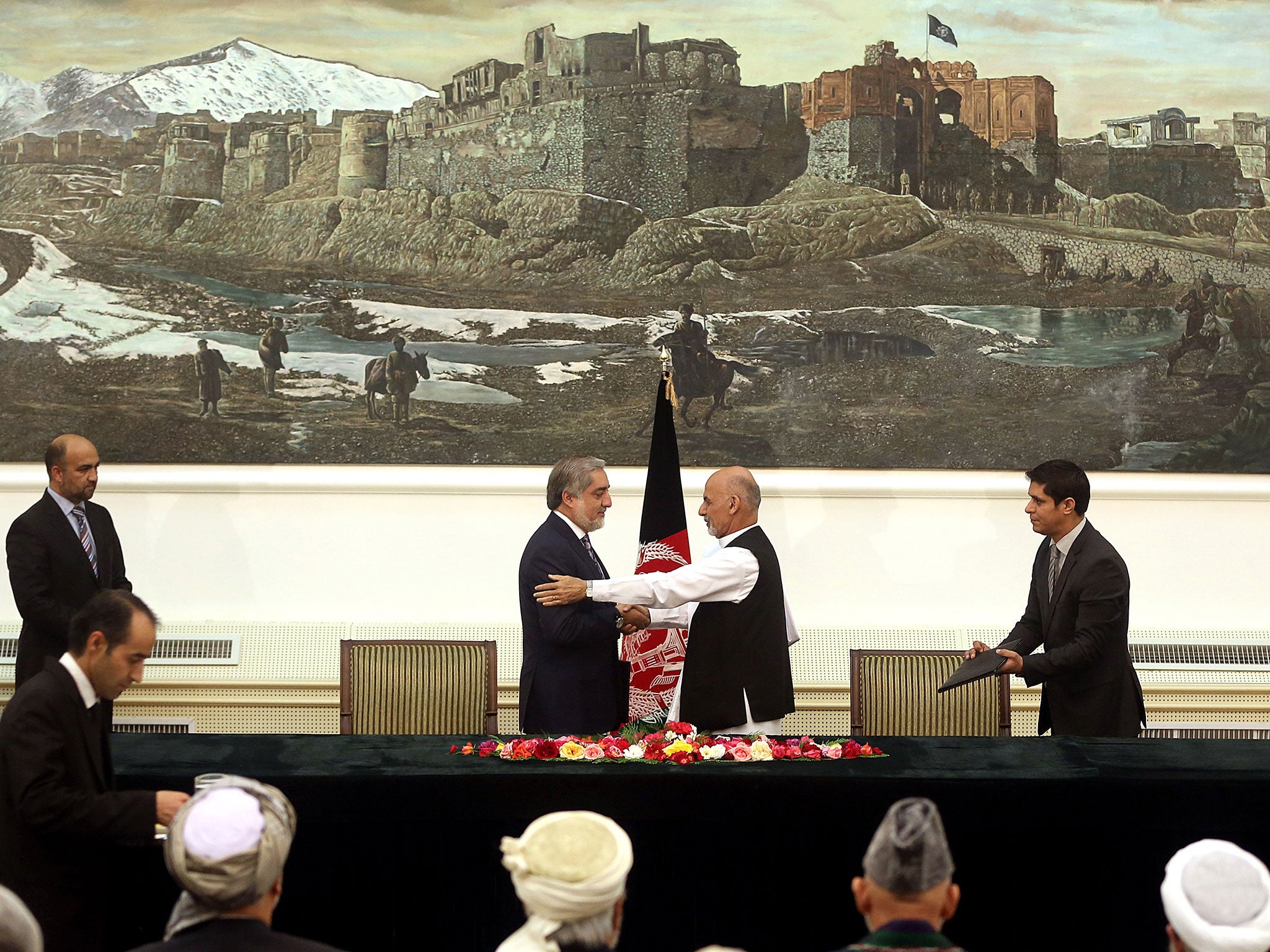Afghanistan: Presidential rivals Ghani and Abdullah choose unity to fight Taliban as Nato troops prepare to quit
New administration faces huge challenge in fighting an emboldened Taliban-led insurgency while still paying its bills amid plummeting tax revenue

Your support helps us to tell the story
From reproductive rights to climate change to Big Tech, The Independent is on the ground when the story is developing. Whether it's investigating the financials of Elon Musk's pro-Trump PAC or producing our latest documentary, 'The A Word', which shines a light on the American women fighting for reproductive rights, we know how important it is to parse out the facts from the messaging.
At such a critical moment in US history, we need reporters on the ground. Your donation allows us to keep sending journalists to speak to both sides of the story.
The Independent is trusted by Americans across the entire political spectrum. And unlike many other quality news outlets, we choose not to lock Americans out of our reporting and analysis with paywalls. We believe quality journalism should be available to everyone, paid for by those who can afford it.
Your support makes all the difference.Afghanistan’s rival presidential candidates signed a deal to share power today, after months of turmoil over a disputed election that has destabilised the country just as most foreign troops prepare to leave.
Ashraf Ghani, a former finance minister who will be named president, embraced rival Abdullah Abdullah after they signed the agreement at a ceremony watched by outgoing president Hamid Karzai.
The new administration faces huge challenges, both in fighting an emboldened Taliban-led insurgency and in paying its bills amid plummeting tax revenue.
It will also be expected to improve the lives of ordinary Afghans even as aid flows fall and contracts with the Nato-led coalition dry up at the end of the year, when most foreign troops will quit the country.
The accord was brokered by US Secretary of State John Kerry, who swiftly welcomed its signing. “These two men have put the people of Afghanistan first, and they’ve ensured that the first peaceful democratic transition in the history of their country begins with national unity,” he said.
Under the deal, the election winner will govern with a chief executive proposed by the runner-up, sharing control over executive decisions and who leads key institutions such as the Afghan army.
One of Mr Ghani’s first acts would be to sign a long-delayed bilateral security agreement with the United States. He has previously declared support for the pact, which would allow a small force of foreign troops to remain in Afghanistan after 2014.
There is a risk that any instability in Afghanistan could be exploited by neighbours such as Pakistan, whose meddling in Afghan affairs have inflamed conflicts that have dogged the country for decades.
“A difficult and challenged unity structure is still preferable to conflict between these two groups,” said one US official. “Having them both working together within the government and direct their energies towards positive reform is, again, preferable to some of the alternatives.”
Mr Ghani, an ethnic Pashtun, and Mr Abdullah, whose main support comes from the country’s second largest ethnic group, the Tajiks, face a difficult task forging unity in a country riven by ethnic and tribal rivalries.
Mr Abdullah’s accusation that the run-off election was rigged in Mr Ghani’s favour had raised fears of ethnic violence, which could have ignited a broader conflict.
“A spark could have dealt a strong blow to the political process if today’s deal had not happened,” said Waliullah Rahmani, director of the Kabul Centre for Strategic Studies. “But, we have crossed that moment.”
The final points of the deal were thrashed out late on Saturday night, as the Independent Election Commission prepared to release results of a UN-monitored audit of all 8 million ballots cast in the June run-off.
But today it was unclear whether the size of Mr Ghani’s winning margin would be announced, as Mr Abdullah’s team has argued that the audit failed to properly adjudicate on fraud.
The disputed preliminary count had shown a win for Mr Ghani with 56 per cent of the vote.
Reuters
Join our commenting forum
Join thought-provoking conversations, follow other Independent readers and see their replies
Comments